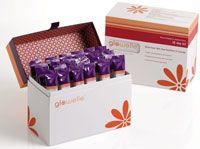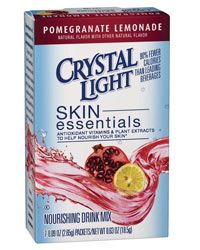CPC Ingredients - Saving Face
Originally Published
Originally Published NO January/February 2010

It can take years for an ingredient to find market success. But one flower has an ingredient that's gained profits and consumer trust, quickly.
The marigold flower is made up largely of something called lutein. This carotenoid, which gives the marigold its red-orange color, has received heavy interest for possible benefits to eye health since the late 1980s-namely, for having a positive effect on age-related macular degeneration. But lutein is also the subject of growing research for another healthy, even sexy, benefit: better skin.
Published studies with lutein and zeaxanthin-another antioxidant found naturally with lutein-on skin health began emerging in the 1990s, when scientists first discovered its presence in human skin. But a decade or so of research now tells us much more. It turns out that lutein can actually improve skin hydration and elasticity, prevent oxidative stress, and protect the skin from the sun's damaging blue light.
With this added knowledge about the ingredient, lutein suppliers and product designers have been setting their sights on a new lutein market: nutricosmetics.

One lutein supplier that has quickly repositioned its lutein for skin health is Cognis Nutrition & Health (Cincinnati). Cognis supplies its Xangold brand natural lutein esters in various formats, including oils, beadlet forms, and Super Xangold, a 5:1 ratio of lutein and zeaxanthin esters. And when the company's Xangold natural lutein esters were launched in Glowelle water-dispersible powders in 2008, it was a clear sign of marketing towards a new demographic of beauty-concerned consumers. After all, consumers are already familiar with nutrient-enhanced beverages such as vitamin- or energy-enhanced beverages.
Cognis senior marketing manager Sharrann Simmons insists that lutein's move into skin health is making for a smooth transition. "Lutein is one of those natural nutrients that's well accepted, safe, and proven effective thanks to eye health research," says Simmons. "We see repositioning lutein into the growing skin health category as easier for these reasons."
Cognis isn't the only lutein supplier taking advantage of the new market. DSM Nutritional Products (Parsippany, NJ) is also seizing upon the new opportunity. DSM offers lutein products with FloraGlo brand lutein, supplied by lutein manufacturer Kemin Health (Des Moines, IA). DSM's FloraGlo lutein is available with the company's Actilease beadlet technology, which allows for proven availability of lutein with applications that rely on cold water dispersibility. Diet applications include beverages, bars, yogurts, and dietary supplements, all lending to the idea of hydration. The company states that FloraGlo is the most clinically tested lutein ingredient to date.
"Antioxidants in particular are well known for their role in protecting the skin from everyday occurrences such as exposure to UV light and pollution," says DSM marketing manager Aparna Parikh. "However, consumers are increasingly taking a broader view of what affects their looks and what they can do to enhance them. The idea of 'you are what you eat' is gaining a stronger foothold." In 2007, Kline & Co. estimated that the "beauty from within" market could reach $2.5 billion by 2012. (Whether the category performs according to original projections remains to be seen.)
With major profit opportunities available, global food giants like Nestlé and Kraft are also grabbing at the chance. Major retail cosmetic stores, from Neiman Marcus to Lippe Taylor, are now carrying these companies' products in readymade beverages and powder packs, for new and convenient alternatives to skin lotions and other topical products.

"Drinking water is one way to help keep skin at its best," says Mary Garris, senior associate brand manager for Kraft's Crystal Light beverages containing lutein, "...so it was a natural fit to introduce Crystal Light Skin Essentials, which contains antioxidant vitamins A, C, and E, as well as carotenoids lutein and zeaxanthin that help hydrate and nourish skin from within. Our consumers are pleased with this new product extension, as it offers them new and unique benefits."
With vastly improving research and an equally increasing presence of lutein in the eye health and skin health market sectors, the ingredient is becoming more commonly accepted as an essential nutrient for overall health. Various vegetables, leafy greens especially, contain amounts of lutein, but hardly enough to conveniently satisfy our bodies' needs. Lutein, from its high bioavailability in marigolds, is already a common ingredient in commercial ocular vitamins and multivitamins marketed for eye health support.
"Lutein isn't just for the 60-plus, anymore," says Heather Richardson, product manager for Kemin Health. "It's for healthy people, as well. These are essential nutrients that you need to help your eyes function at their very best and as they get older. Skin [health is] another benefit we're discovering, and when consumers really grasp that it's an essential nutrient in several ways, more and more awareness will appear."
What to Watch for
One ongoing lutein study could have major implications on lutein's development into a stronger, more viable ingredient.
The second age-related eye disease study (AREDS2) is evaluating the effect of lutein, zeaxanthin, and omega-3 fatty acid supplementation on 4000 patients at high risk of age-related macular degeneration. As with skin, these ingredients can lessen the impact of harmful blue light on the eye along with other perceived benefits to eye health.
While the study is aimed at eye health research, it's the largest human clinical trial ever to evaluate these ingredients, and any positive outcome will undoubtedly improve lutein's standing in the dietary supplement industry at large. AREDS2 is expected to conclude by 2012.

